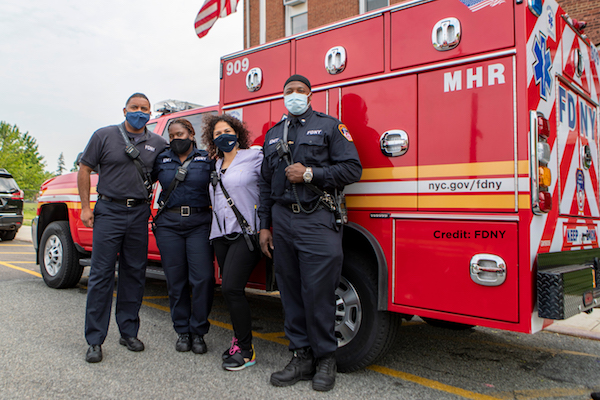
Mental health first responders via B-HEARD
Last week, the New York City Council voted to amend the City Charter to establish the Mayor’s Office of Community Mental Health as a permanent part of our city government. The vote comes at a critical time – as New Yorkers continue to feel the long-lasting mental health consequences of the pandemic.
The vote is also the culmination of years of work. In the wake of decades of state and federal neglect that left too many people without the mental healthcare they need, New York City became the first major American city to support mental health services through local tax levy funds. As a result, today New York City is delivering more mental health services, in more places and in more ways than ever before. These services are essential and effective.
Built on the strong foundation of ThriveNYC, our office coordinates a much-needed, all-government approach to mental health, and works with 13 city government agencies and over 200 community-based organizations to close gaps in mental health care through innovation. Our programs are not intended to replace the behavioral health-care system, but to enhance and supplement it with a laser focus on reaching people who would otherwise go without care.
The results are clear. Older adults with depression and anxiety are getting better thanks to clinicians we brought to senior centers. Victims of crime feel safer because of advocates we placed in every police precinct. New Yorkers with serious mental illness are staying engaged in care and securing permanent housing through mobile treatment teams the city created to fill in where state funding fell short. Since 2016, New Yorkers have reached out to our mental health helpline – 1-888-NYC-WELL – more than 1.5 million times for help, with calls soaring during the pandemic. Ninety-three percent were satisfied their needs were met.
In the face of a nationwide social worker shortage, we have demonstrated new ways to deliver needed mental health support without trained clinicians. Right now, the new Academy for Community Behavioral Health, run by CUNY School of Professional Studies in partnership with our office and the Mayor’s Office for Economic Opportunity, is offering free courses and certification programs for social service providers and city government employees. The training will help them provide basic mental health support to the people they serve.
In Harlem, we are pioneering the city’s first health-centered, non-police response to 911 mental health emergencies. Early results show more people accepting help, fewer hospitalizations, and more community-based care. This is the next frontier of mental health emergency response reform, but it’s not the full story.
We also worked with the city Health Department to expand health-only mobile crisis teams that can be deployed through NYC Well, not 911. Now, from 8am to 8pm every day, these teams can arrive within two hours to help people in an urgent crisis – up from 2014 average wait times of longer than a day.
Recently we launched a new approach to prevent the next emergency, working with FDNY Emergency Medical Services and the Health Department to reach out to the 300 or so people who call 911 for mental health issues more than three times each month. With a proactive connection to needed services, we hope to prevent the next moment of crisis, and reduce the use of emergency resources.
We are also expanding mobile treatment teams and member-run Clubhouses across the city – with the goal of better serving more people with serious mental illness. As of this month, we are bringing new mental health services to every domestic violence shelter in the city, creating new treatment hubs for youth and young adults – especially those who have run away or experienced homelessness, and adding more clinicians to senior centers in communities of color.
There is so much more to do, especially as New York City continues to recover from the pandemic – which created significant mental health challenges and exacerbated long-standing inequities. It is time for the citywide conversation on mental health to focus on the future – we must be talking about how to bring more mental health support to people who need it most. An equity lens must guide every strategy going forward: we have greatly expanded connections to mental health care, but still not everyone has access to the care they need.
The next mayoral administration faces major challenges. Promoting mental health for all New Yorkers must be one of the highest priorities. Thanks to the leadership of Mayor de Blasio, First Lady Chirlane McCray, and the New York City Council – leaders in the future will also have more tools to tackle these challenges than ever before, including and especially the Mayor’s Office of Community Mental Health.
***
Susan Herman is Director of Mayor’s Office of Community Mental Health. On Twitter @MentalHealthNYC.
***
Have an op-ed idea or submission for Gotham Gazette? Email This email address is being protected from spambots. You need JavaScript enabled to view it.




